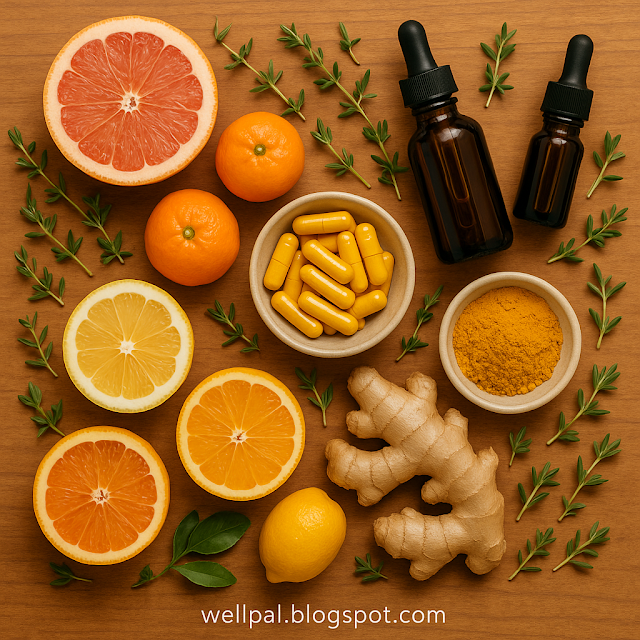- Get link
- X
- Other Apps
Build robust immunity with targeted nutrients, adaptogens, and smart daily habits.
Use science-informed strategies to strengthen defenses in every season.
Educational only—talk with a qualified clinician before changing supplements or medications.
Why Immune Optimization Matters 🌟
Imagine breezing through cold season or bouncing back faster after a minor bug. Proactive immune optimization means giving your body key building blocks (vitamins, minerals, adaptogenic botanicals) while dialing in sleep, stress, movement, and nutrition—so your defenses stay ready year-round.
📋 Self-Check: Are you immune-optimized?
Answer 10 yes/no questions. A brief 2-second analysis (with an ad) appears before your tailored action plan.
⏳ Analyzing your responses…
Important: Doses are examples from common references—individual needs vary. Check medications and allergies; seek medical advice if uncertain.
Empathy Story: When immunity feels like a tug-of-war
Anna, a kindergarten teacher, felt wiped out every fall. She added a morning vitamin-D routine and a calming adaptogen tea during planning time. Within weeks she noticed steadier energy and fewer off days—small, consistent habits made a big difference.
Expert Insights: The cornerstones of resilience 🩺
Host: What’s the foundation of a resilient immune system?
Guest: Enough sleep, balanced nutrients (like vitamin D and zinc), movement, and stress management—these pillars keep cellular defenses coordinated.
Host: Where do adaptogens fit?
Guest: When appropriate, they can support stress balance—use quality products and monitor how you feel.
Host: Lifestyle’s role?
Guest: It’s the “mortar” that binds your plan—regular routines make immune habits stick.
Science-informed strategies & solutions 🔍
1) Vitamin D sufficiency
- Idea: Supports antimicrobial peptide activity.
- Example: Many aim for ~2,000–4,000 IU/day or as needed to maintain healthy 25(OH)D—personalize with your clinician.
2) Zinc support
- Idea: Helps T-cell development and signaling.
- Example: ~15–30 mg elemental zinc/day with food; avoid excess and drug interactions.
3) Vitamin C & bioflavonoids
- Idea: Antioxidant support for barriers and cells.
- Example: ~500–1,000 mg once or twice daily; some pair with quercetin.
4) Adaptogenic herbs
- Idea: Support a balanced stress response.
- Example: Standardized Ashwagandha or Rhodiola; consider cycles and professional guidance.
5) Probiotic & prebiotic intake
- Idea: Gut-immune crosstalk via GALT.
- Practice: Multi-strain probiotics + prebiotic fibers (inulin/resistant starch) and fermented foods.
6) Sleep hygiene
- Idea: Consistent 7–9 h supports immune “memory”.
- Tips: Regular schedule; wind down without screens; cool, dark room.
7) Moderate exercise
- Idea: Mobilizes key immune cells.
- Plan: ~150 min/week aerobic + 2 strength sessions; add gentle outdoor walks.
📊 Quick Poll: Which immune strategy will you try first?
FAQ: Top 5 immune questions 🧐
How much vitamin D should I take for immunity?
Many adults use ~2,000–4,000 IU/day, but testing and medical guidance are best to personalize and avoid excess.
Are adaptogens safe long-term?
Most people tolerate short-term use; check interactions (e.g., thyroid, BP, meds) and consider cycling with practitioner oversight.
Can probiotics really affect immunity?
Gut health and immune function are linked. Multi-strain probiotics and fermented foods may help—responses vary by person and product.
What’s the best sleep strategy for immune health?
Consistent 7–9 hours, a wind-down routine, and a cool, dark room support healthy immune rhythms.
How does stress undermine immunity?
Chronic stress can dampen immune responses. Brief daily practices—breathwork, nature walks, or meditation—help keep stress in check.
CTA: Take charge of your immunity 🌱
Pick one tweak—vitamin D check-in, probiotic foods, or a 10-minute breathwork session—and track it for 30 days. Consistency compounds.
- 😴 Protect sleep: 7–9 h, same schedule
- 🥗 Colorful plants + fermented foods
- 🧘 Daily stress reset (breathing, walk, stretch)
This article is educational and not medical advice. Consult your clinician for individualized care.
Explore All Wellness Series – Daily Habits for Longevity, Brain Health & Balanced Living
Explore All Wellness Series – Daily Habits for Longevity, Brain Health & Balanced Living
Discover our full collection of wellness series designed to improve your healthspan, mental clarity, and lifestyle alignment.
💚 Thank you for reading!
We hope this post helped you feel informed, supported, and inspired.
Stay well and come back anytime.



Comments
Post a Comment